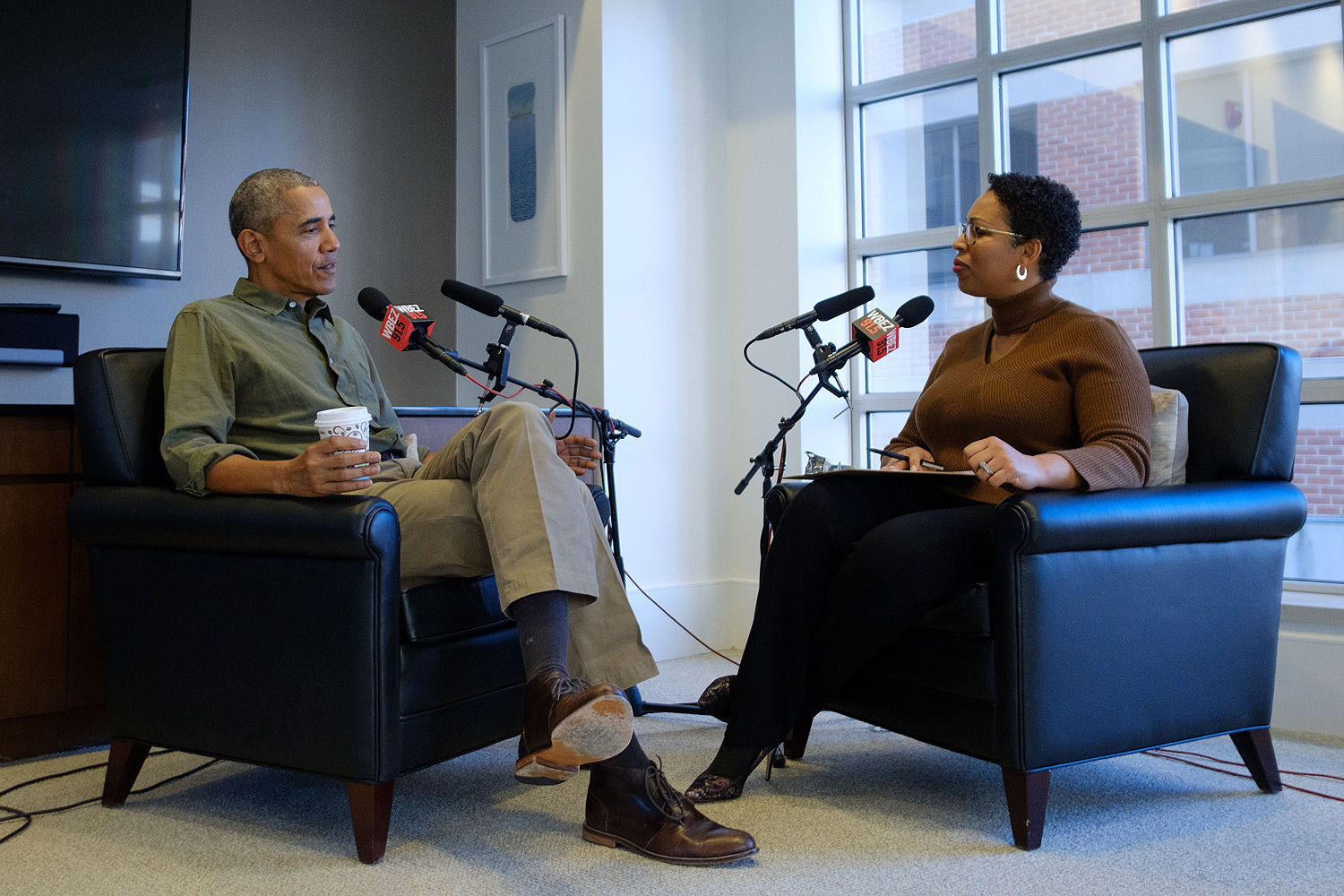"A story like mine could have happened in another city, but my story could have only happened here,” former President Barack Obama says in an excerpt of the new six-part documentary podcast, “Making Obama,” which WBEZ debuts today.
The two decades of Obama’s life between his mid-‘80s arrival in Chicago to his star-making keynote address at the 2004 Democratic National Convention are considered by insiders—and Obama himself—to be his most politically and ideologically formative. That period is the subject of a new six-part documentary podcast, hosted by anchor Jenn White and produced by Colin McNulty (the duo was also behind WBEZ’s 2017 docu-podcast, “Making Oprah”) and traces Obama’s path via interviews with more than 50 friends, advisors, mentors and opponents—and Obama himself.
Though the 44th president’s backstory has been explored before, including in his 1995 memoir, White says that “Making Obama” focuses the idiosyncrasies of Chicago’s history, politics and population and why they were instrumental in shaping the future president.
White spoke to Chicago about some of the intriguing, lesser-known and long-forgotten plot points in the early Obama timeline.
An “intervention brunch” was almost the end of the road for Obama’s political aspirations.
White says that after Obama lost to incumbent Rep. Bobby Rush in the 2000 primary for an Illinois congressional seat, the Obamas were deeply in debt and Michelle was ready to draw the line.
“There’s a story about when he’s at the 2000 DNC and trying to rent a car and his credit card gets rejected,” White says. “When he wants to run for senate [in 2002], a lot of people, including Valerie Jarrett, were like ‘Whoa, whoa, whoa.’ They had what they described as an intervention brunch. But by the end, Obama had convinced them it was going to work. Still, Michelle Obama said, ‘you know, this is the last one. It has to work.’ He was stretched pretty thin.”
Obama wasn’t exactly a natural campaigner.
White says it was Carole Anne Harwell, his first campaign manager, who showed Obama the ropes. “When it came to learning about Chicago politics 101, she was the one who taught him how it’s done, like how if you’re campaigning in the winter in Chicago and you’re going on your first door-to-door signature gathering. Obama has on this bomber jacket and no gloves and no hat. And he get horribly sick. Harwell thought, ‘Michelle is going to kill me.’ Harwell laid down groundwork that made him more efficient; she says if she hadn’t, he’d talk to someone for hours and they’d only get three signatures.”
The famous “skinny kid with a funny name” pitch was initially a dud.
Obama has often riffed on his uncommon name and biracial background to highlight the broad appeal of his diversity and his position an underdog outsider. “The whole story he tells about his funny name and how his mom is from Kansas and his dad is from Kenya—Rev. Alvin Love, who opens the series, talks about how that shtick doesn’t really land with him,” White says. “But he said it wasn’t a way of disarming other people, it was a way of [Obama] settling his own nerves. Because he felt like an outsider. He didn’t come here and feel like a Chicagoan. It took a while for him to stop feeling like an outsider. That uncertainty is so at odds with the image so many people have as Barack Obama. By the time people see him, he’s a more polished politician.”
The famous 2004 DNC keynote speech took a lot of negotiation.
“There was some jockeying back and forth about the language he used in that speech between people on his team and people on [Democratic presidential nominee] John Kerry’s team. Obama apparently had some choice language [his team] thought would resonate deeply with the crowd. Hearing what he could use and couldn’t use was a lot of fun.”
A cool, calm and collected president, Obama was a one-time loser (and bruiser).
“People don’t think of Obama as losing races,” White says, who singled out the 2000 congressional primary in which Obama took a thumping from incumbent Rep. Bobby Rush. “The way the city is segmented, racially, is a big part of its political history and why it’s difficult to break into politics here. I think you see some of that in his race against Bobby Rush where his ‘outsiderness’ came to a head,” White says. “There was a sense Obama was backed by people who weren’t black Chicagoans. And he wasn’t born in Chicago. There was a sense in Chicago that we gotta know who you are. We gotta know who sent you. We gotta have proof. And I think it took him a while to build up his resume. In his early congressional ad, they say his name like 30 times because no one knew who he was.”
White notes that before Obama’s loss to Rush, his reputation had already taken a hit when he played hardball in the 1996 state senate race and got his onetime friend and mentor, Alice Palmer, kicked off the ballot. “We have the story from a number of different people—and some of the political fallout from that followed him for a while and caused some tension with some other state senators.”
“A lot of people felt that If there hadn’t been a Harold Washington, there would be no President Barack Obama,” White says.
“Part of what we do in the podcast is take a step away from the presidency and look at the presidency of Mayor Harold Washington and how him becoming the first black mayor of Chicago really paved the way for Barack Obama’s career,” White says. “When you hear audio from Washington’s time as mayor, there are some interesting moments when you think about his relationship with City Council [and] the way it resonates with Obama’s relationship to Congress.”




